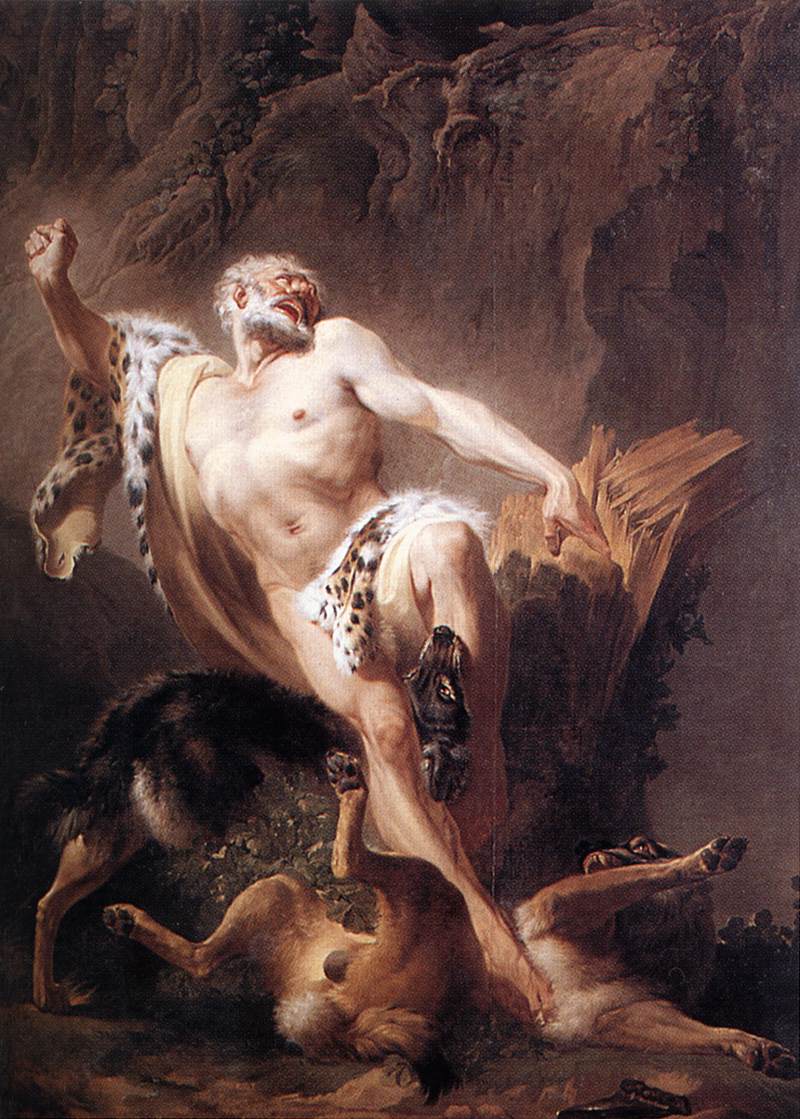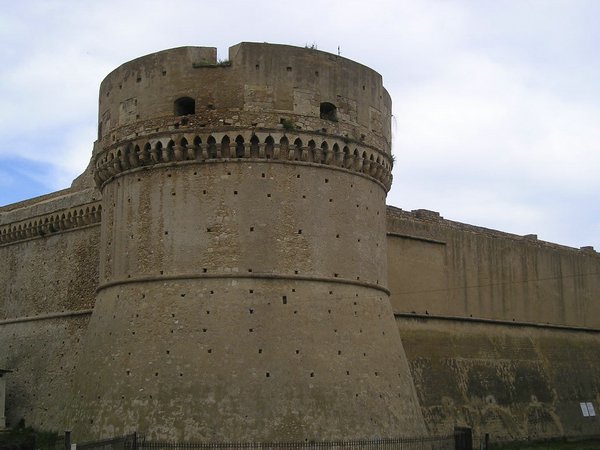|
Idyll IV
Idyll IV, also titled Νομεῖς ('The Herdsmen'), is a bucolic poem by the 3rd-century BC Greek poet Theocritus.Edmonds, ed. 1919, p. 49. The poem is a conversation between a goatherd named Battus and his fellow goatherd Corydon, who is acting oxherd in place of a certain Aegon who has been persuaded by one Milon son of Lampriadas to go and compete in a boxing-match at Olympia. Corydon's temporary rise in rank gives occasion for some friendly banter, varied with bitter references to Milon's having supplanted Battus in the favours of Amaryllis. Summary Battus and Corydon, two rustics, meeting in a glade, gossip about their neighbour, Aegon, who has gone to try his fortune at the Olympic games.Lang, ed. 1880, p. 19. After some banter, the talk turns on the death of Amaryllis, and the grief of Battus is disturbed by the roaming of his cattle. Corydon removes a thorn that has run into his friend's foot, and the conversation comes back to matters of rural scandal. The poem, like ma ... [...More Info...] [...Related Items...] OR: [Wikipedia] [Google] [Baidu] |
Pastoral
A pastoral lifestyle is that of shepherds herding livestock around open areas of land according to seasons and the changing availability of water and pasture. It lends its name to a genre of literature, art, and music (pastorale) that depicts such life in an idealized manner, typically for urban audiences. A ''pastoral'' is a work of this genre, also known as bucolic, from the Greek , from , meaning a cowherd. Literature Pastoral literature in general Pastoral is a mode of literature in which the author employs various techniques to place the complex life into a simple one. Paul Alpers distinguishes pastoral as a mode rather than a genre, and he bases this distinction on the recurring attitude of power; that is to say that pastoral literature holds a humble perspective toward nature. Thus, pastoral as a mode occurs in many types of literature (poetry, drama, etc.) as well as genres (most notably the pastoral elegy). Terry Gifford, a prominent literary theorist, define ... [...More Info...] [...Related Items...] OR: [Wikipedia] [Google] [Baidu] |
Theocritus
Theocritus (; grc-gre, Θεόκριτος, ''Theokritos''; born c. 300 BC, died after 260 BC) was a Greek poet from Sicily and the creator of Ancient Greek pastoral poetry. Life Little is known of Theocritus beyond what can be inferred from his writings. We must, however, handle these with some caution, since some of the poems ('' Idylls''; ) commonly attributed to him have little claim to authenticity. It is clear that at a very early date two collections were made: one consisting of poems whose authorship was doubtful yet formed a corpus of bucolic poetry, the other a strict collection of those works considered to have been composed by Theocritus himself. Theocritus was from Sicily, as he refers to Polyphemus, the Cyclops in the ''Odyssey'', as his "countryman." He also probably lived in Alexandria for a while, where he wrote about everyday life, notably '' Pharmakeutria''. It is also speculated that Theocritus was born in Syracuse, lived on the island of Kos, and lived in E ... [...More Info...] [...Related Items...] OR: [Wikipedia] [Google] [Baidu] |
Ancient Olympic Games
The ancient Olympic Games (Ὀλυμπιακοὶ ἀγῶνες; la, Olympia, neuter plural: "the Olympics") were a series of athletic competitions among representatives of city-states and were one of the Panhellenic Games of Ancient Greece. They were held in honor of Zeus, and the Greeks gave them a mythological origin. The originating Olympic Games are traditionally dated to 776 BC. The games were held every four years, or Olympiad, which became a unit of time in historical chronologies. They continued to be celebrated when Greece came under Roman rule, 2nd century BC. Their last recorded celebration was in AD 393, under the emperor Theodosius I, but archeological evidence indicates that some games were still held after this date.Hamlet, Ingomar. "Theodosius I. And The Olympic Games". Nikephoros 17 (2004): pp. 53-75. The games likely came to an end under Theodosius II, possibly in connection with a fire that burned down the temple of the Olympian Zeus during his reign. D ... [...More Info...] [...Related Items...] OR: [Wikipedia] [Google] [Baidu] |
Milo Of Croton
Milo or Milon of Croton (late 6th century BC) was a famous ancient Greek athlete. He was most likely a historical person, as he is mentioned by many classical authors, among them Aristotle, Pausanias, Cicero, Herodotus, Vitruvius, Epictetus, and the author of the ''Suda'', but there are many legendary stories surrounding him. He was born in the Greek colony of Croton in Southern Italy. He was a six time Olympic victor; once for Boys Wrestling in 540 BC at the 60th Olympics, and five time wrestling champion at the 62nd through 66th Olympiads. Milo kept on competing, even well after what would have been considered a normal Olympic Athlete's prime: by the 67th Olympiad, he would have been over 40 years of age. He also attended many of the Pythian Games. Diodorus Siculus wrote in his history that Milo was a follower of Pythagoras and also that he commanded the Crotonian army which defeated the Sybarites in 511 BC, while wearing his Olympic wreaths and dressed like Hercules in ... [...More Info...] [...Related Items...] OR: [Wikipedia] [Google] [Baidu] |
Crotone
Crotone (, ; nap, label= Crotonese, Cutrone or ) is a city and ''comune'' in Calabria, Italy. Founded as the Achaean colony of Kroton ( grc, Κρότων or ; la, Crotona) in Magna Graecia, it was known as Cotrone from the Middle Ages until 1928, when its name was changed to the current one. In 1992, it became the capital of the newly established Province of Crotone. , its population was about 65,000. History Croton's ''oikistes'' (founder) was Myscellus, who came from the city of Rhypes in Achaea in the northern Peloponnese. He established the city in c. 710 BC and it soon became one of the most flourishing cities of Magna Graecia with a population between 50,000 and 80,000 around 500 BC. Its inhabitants were famous for their physical strength and for the simple sobriety of their lives. From 588 BC onwards, Croton produced many generations of winners in the Olympics and the other Panhellenic Games, the most famous of whom was Milo of Croton. According to Herodotus (3.131), ... [...More Info...] [...Related Items...] OR: [Wikipedia] [Google] [Baidu] |
Corydon (character)
Corydon (Greek Κορύδων ''Korúdōn'', probably related to κόρυδος ''kórudos'' "lark") is a stock name for a shepherd in ancient Greek pastoral poems and fables, such as the one in Idyll 4 of the Syracusan poet Theocritus (c. 300 – c. 250 BC). The name was used by the Latin poets Siculus and, more significantly, Virgil. In the second of Virgil's ''Eclogues'', it is used for a shepherd whose love for the boy Alexis is described therein. Virgil's Corydon gives his name to the modern book ''Corydon''. Corydon is the name of a character that features heavily in the Eclogues of Calpurnius Siculus. Some scholars believe that Calpurnius represents himself, or at least his "poetic voice"Hubbard, T.K. The Pipes of Pan (1996) pp 152 through Corydon, Corydon is mentioned in Edmund Spenser's ''The Faerie Queen'' as a shepherd in Book VI, Canto X. In this section he is portrayed as a coward who fails to come to the aid of Pastorell when she is being pursued by a tig ... [...More Info...] [...Related Items...] OR: [Wikipedia] [Google] [Baidu] |
Ζacynthus
Zakynthos (also spelled Zakinthos; el, Ζάκυνθος, Zákynthos ; it, Zacinto ) or Zante (, , ; el, Τζάντε, Tzánte ; from the Venetian form) is a Greek island in the Ionian Sea. It is the third largest of the Ionian Islands. Zakynthos is a separate regional unit of the Ionian Islands region, and its only municipality. It covers an area of and its coastline is roughly in length. The name, like all similar names ending in , is pre-Mycenaean or Pelasgian in origin. In Greek mythology the island was said to be named after Zakynthos, the son of the legendary Arcadian chief Dardanus. Zakynthos is a tourist destination, with an international airport served by charter flights from northern Europe. The island's nickname is "the Flower of the Levant", bestowed upon it by the Venetians who were in possession of Zakynthos from 1484 to 1797. History Ancient history The ancient Greek poet Homer mentioned Zakynthos in the ''Iliad'' and the ''Odyssey'', stating that ... [...More Info...] [...Related Items...] OR: [Wikipedia] [Google] [Baidu] |
Eclogue 3
Eclogue 3 (''Ecloga'' III; ''Bucolica'' III) is a pastoral poem by the Latin poet Virgil, one of a collection of ten poems known as the "Eclogues". This eclogue represents the rivalry in song of two herdsmen, Menalcas and Damoetas. After trading insults, the two men decide to have a singing competition, for which each offers a prize (Damoetas a female calf and Menalcas a pair of ornamented cups). A neighbour, Palaemon, who comes along by chance, agrees to be the judge. The second half of the poem consists of the contest, in which each of the two competitors in turn sings a couplet and the other caps it with another couplet (each singing 12 couplets in all). In the end Palaemon brings the contest to an end and declares it a draw. The poem is based mainly on the bucolic Idyll V, Idyll 5 of the 3rd century BC Greek poet Theocritus, but with elements added from Idyll IV, Idyll 4 and other Theocritean idylls.Farrell (1992), p. 66. Like Theocritus's ''Idylls'' 4 and 5, and all of Virgil' ... [...More Info...] [...Related Items...] OR: [Wikipedia] [Google] [Baidu] |
Perseus Digital Library
The Perseus Project is a digital library project of Tufts University, which assembles digital collections of humanities resources. Version 4.0 is also known as the "Perseus Hopper", and it is hosted by the Department of Classical Studies. The project is mirrored by the Max Planck Society in Berlin, Germany, as well as by the University of Chicago. History The project was founded in 1987 to collect and present materials for the study of ancient Greece. It has published two CD-ROMs and established the Perseus Digital Library on the World Wide Web in 1995. The project has expanded its original scope; current collections cover Greco-Roman classics and the English Renaissance. Other materials, such as the papers of Edwin Bolles and the history of Tufts University, have been moved into the Tufts Digital Library. The editor-in-chief of the project is Gregory R. Crane, the Tufts Winnick Family Chair in Technology and Entrepreneurship. He has held that position since the founding of th ... [...More Info...] [...Related Items...] OR: [Wikipedia] [Google] [Baidu] |
Ancient Greek Poems
Ancient history is a time period from the beginning of writing and recorded human history to as far as late antiquity. The span of recorded history is roughly 5,000 years, beginning with the Sumerian cuneiform script. Ancient history covers all continents inhabited by humans in the period 3000 BCAD 500. The three-age system periodizes ancient history into the Stone Age, the Bronze Age, and the Iron Age, with recorded history generally considered to begin with the Bronze Age. The start and end of the three ages varies between world regions. In many regions the Bronze Age is generally considered to begin a few centuries prior to 3000 BC, while the end of the Iron Age varies from the early first millennium BC in some regions to the late first millennium AD in others. During the time period of ancient history, the world population was already exponentially increasing due to the Neolithic Revolution, which was in full progress. While in 10,000 BC, the world population stood at ... [...More Info...] [...Related Items...] OR: [Wikipedia] [Google] [Baidu] |

.jpg)





